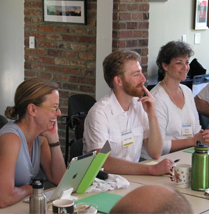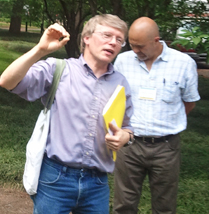 |
RATIONALE
Humanity faces a set of intensifying sustainability crises that both fundamentally challenge our understandings of human impacts on the natural world and demand new capacities for averting or coping with environmental change. In this time of urgency and uncertainty, institutions of higher education have a vital role in helping the public to meet the many challenges to environmental sustainability. Many individuals and institutions have taken up this challenge, as evidenced by the formation and development of organizations such as the American Association of Sustainable Higher Education and initiatives like the US Partnership for Education for Sustainable Development. |

PROJECT GOAL
One way that individual scholars from across the disciplines are addressing these issues is through their teaching, by focusing on environmental problems as central components of their courses and by embracing interdisciplinary pedagogies that encourage critical thinking, problem solving, and leadership development. Over the last decade, many universities have sought to encourage these innovations in all disciplines by providing educators intensive workshop opportunities to (re)design courses with significant environmental components. |
 |

PROJECT DESCRIPTION
It is toward this goal that Vanderbilt’s Program in American Studies and the Vanderbilt Center for Teaching are proud to announce a second round of proposals for the Cumberland Project. Modeled on Emory University’s Piedmont Project and Northern Arizona University’s Ponderosa Project, the Cumberland Project is a two-day workshop on May 7th and 8th, 2012 in which Vanderbilt faculty engage in discussions and course designing workshops with Vanderbilt leaders in sustainability education. The workshop joins intellectual stimulation with an opportunity to meet with faculty from around the university and to learn about an array of sustainability resources available on our campus and within our community.
The project is intended to build on and strengthen a continuing, vibrant teaching and learning community around sustainability themes. Therefore, particular emphasis will be placed on environmental education that is highly interdisciplinary in scope and inclusive of a wide array of environmental studies across the natural sciences, social sciences, and humanities.
Participants will receive $500 in research funds for their participation in the two-day workshop. |

HOW TO APPLY
Faculty who would like to develop a new course module or a new course that engages issues of sustainability and environmental awareness are encouraged to apply. No prior experience with environmental issues in the classroom or in research is necessary.
Send a short, one-paragraph description of how you plan to change an existing course or develop a new one that will incorporate environmental and/or sustainability issues in Word format to Joe Bandy, Assistant Director for The Center for Teaching, joe.bandy@vanderbilt.edu. |

|